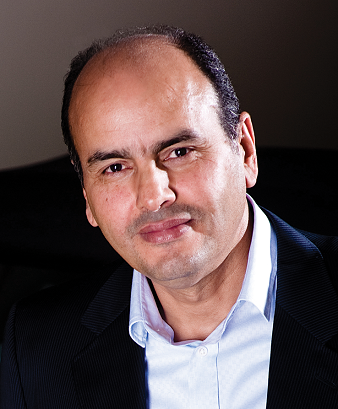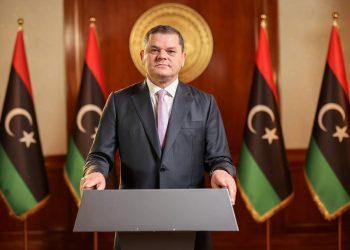
From the Tripoli suburb of . . .[restrict]Qasr Ben Gashir, Otman Elbasir has been Professor of Computer Engineering at University of Waterloo in Canada for the past13 years. Before that, he was chair of Department of Systems and Computing at the University of Guelph in Canada. Married with five children aged 21 to 32, one of his daughters is also a professor at Waterloo, he was founded in 1999 Intelligent Mechatronic Systems Inc. (IMS) a car technology company that that now has a presence in US, Canada, Mexico and Europe. He is also one of the 12 nominees from the House of Representatives for the post of prime minister, supposed to be chosen by members of the Libya Dialogue negotiations this week.
He spoke to the Libya Herald about what he sees as priorities for the new Government of National Accord (GNA) and the crucial issue of security in Libya.
By Michel Cousins.
Tunis, 10 September 2015:
Otman Elbasir is sure that once the Government of National Accord (GNA) is agreed by the House of Representatives and the General National Congress, it will be able to operate in the capital. “I believe that Tripoli will be safe enough. There will be challenges, but not as severe as some think,” he says.
The reason for his confidence, he explains, is that parties opposed to each other will be part of the GNA or associated with it. As a result it will have credibility. International support will add to that credibility, he believes.
That does not mean there will not be threats, he says. “There’ll need to be a force that can address any threats”, such as a group trying to occupy a ministry, although he feels such attacks are less likely than before.
He is firmly convinced the requirement in the Dialogue agreement, that all militias withdraw from Tripoli, will be used by them to “save face”, as he puts it, and that they will retire from the scene, knowing that if they refuse they will be under threat – physical and legal. Perhaps just two to five percent of the militia will have to be dealt with by force, he says.
As for Benghazi and the Islamic State, they will have to be dealt with differently. “Missiles in Benghazi are not going to solve the issue,” he says in an implicit criticism of the campaign there by Khalifa Hafter.
“You have to provide exits” for Ansar Al-Sharia and the other militants fighting there, he explains. That means talking to them and encouraging some to change sides while, at the same time, continuing to use force against them. The nature of that force, however, has to change. Instead of using missiles, the army needs to be equipped with both sophisticated equipment and the skills for city warfare.
With those skills, the authorities must then take action. “The government must be willing to take action,” he says. “Tripoli and Benghazi must be under strict [government] control.”
As for Sirte, it can provide a focus of unity for all Libyans, he thinks. All Libyans, he notes, are threatened by the Islamic State (IS). “We can use the situation in Sirte as a catalyst [for unity]. But, he adds, actually dealing with IS may require foreign assistance.
“That will have to be based on what is required in the field.”
Beyond security, the top priority for the new government must be national reconciliation, Elbasir says.
That means reconciliation between everyone involved in the current conflict and with those who supported the former regime. All Libyans, whether now living abroad or displaced internally, have to be able to return home, and feel they can do so freely, he insists. “Libya cannot be a secure and stable country while so many Libyans are living abroad in poverty and without dignity.”
Reconciliation does not mean that those who committed crimes should go free. They must be held to account. But “everyone must be able to go home.”
He suggest the new government include a Ministry of Reconciliation, which would take action through meetings, seminars, the use of the media. “The media has to be programmed and supported to enhance reconciliation,” he states.
Such a ministry would also work to enable Libyans abroad to return safely to their homes. All Libyans abroad, he strsses, have to have cared about. “Every embassy has to treat all Libyans equally and with care.”
A second priority is the revival of trust between Libyans and the government.
This, he believes, can be done by what he refers to as “quick wins” – by rapid solutions to issues that have caused so much suffering to ordinary people: the electricity supply; education; health care; transport (such as rebuilding the shattered airports); and local security (such as getting the police back on the streets). The government not only has to do all this, he says; it has to be seen doing it.
It also needs to be seen taking action against corruption. “It’s huge” and has to be rolled back.
As part of that, but also as an end in itself, centralisation has to end and the role of government reduced, he says. There are those in centralised institutions who use their power to demand money for their services. Such services should be devolved regionally. Moreover, in helping cut corruption and bring services closer to ordinary people, there has to be greater use of eGovernment. Getting the private sector involved in delivering services would also help cut corruption.
On the longer term priorities, the focus has to be on the economy, Elbasir says.
The country is dangerously over dependent on oil income, which, as the present situation shows, with oil at less than $50 a barrel, is unpredictable. There needs to be diversity, he states. But the system, and Libyans, are not geared for that.
“There needs to capacity building. It requires the education system to change.”
Libya needs to get away from a system where people are expected to give standard answers to standard questions to one where they are taught to think. “Libyans are very smart; they are very capable,” he says, pointing to all those Libyans who have succeeded outside the country – the doctors, lawyers, bankers scientists and engineers. “It is the system that failed. As a result they [those inside the country] become inactive contributors to the economy. That has to change.”
As part of educational change, Elbasir wants greater emphasis on the jobs Libya needs. “We need to expand the mid layer of the economy. We need more vocational colleges”, producing electricians, mechanics, plumbers.
Women too have to be empowered. They are being educated and are very capable, he says, but they are not being drawn into the economy. “We must crate programmes that allow women to be active and play their part in society.”
Libya’s tribes and its ethnic minorities – the Amzigh, Tebus and Tuwareg –also need to be embraced, used and valued. The three minorities should be a source of pride for Libyans, he says. It shows Libya to be a country of rich diversity. “Their aspirations should be our aspirations”, he states.
“I am proud of Libya”, he declares. It is result of interaction between civilisations dating back over the millennia. “Libya has always be open to the world and has to be open to the world again,” he insists. [/restrict]







